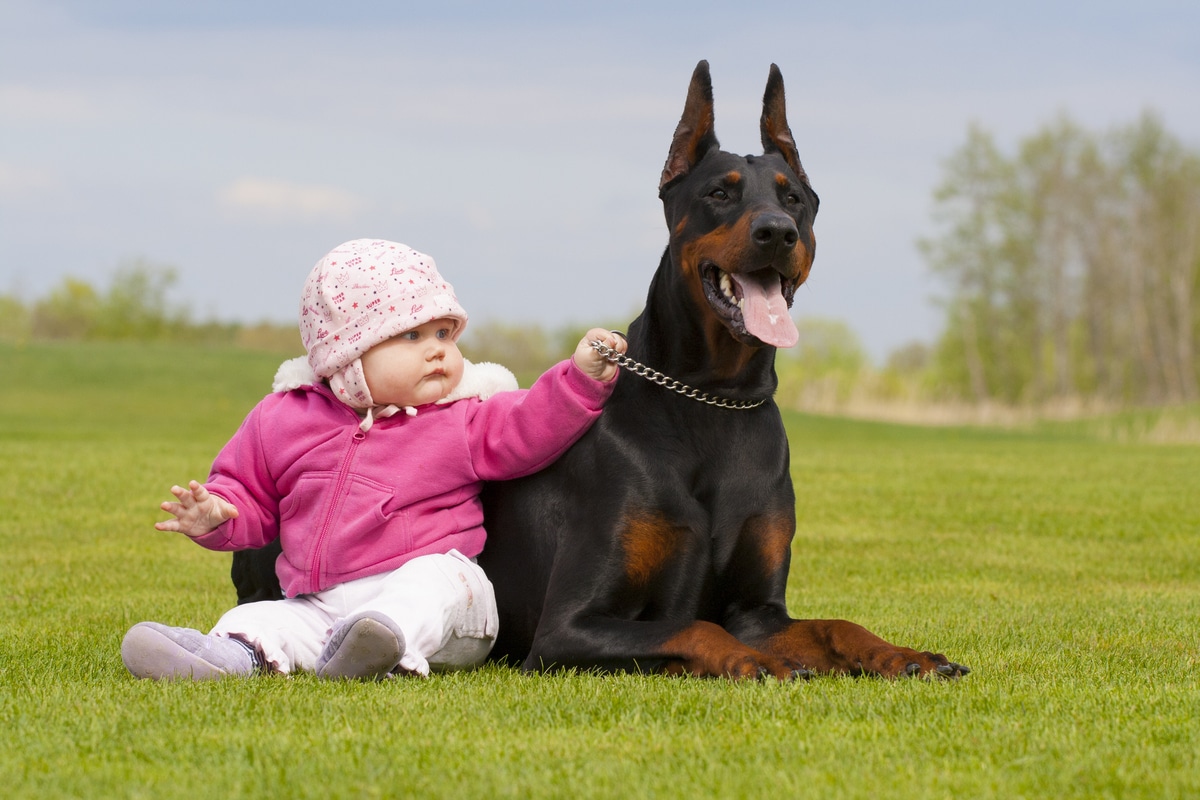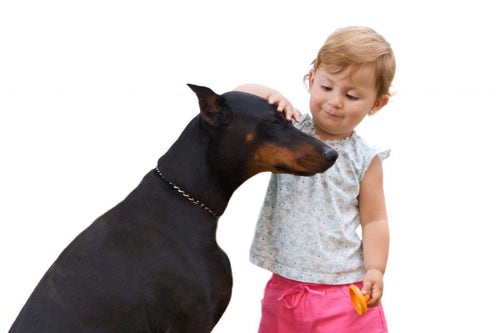When it comes to Dobermans and kids, there is a common misconception that they are aggressive and not suitable for families. However, this couldn’t be further from the truth. In fact, Dobermans can be incredibly gentle and loving towards children, making them excellent companions for kids of all ages.
Dobermans have a long history of being used as family dogs and guardians. Originally bred in Germany in the late 19th century, Dobermans were specifically bred to be reliable and loyal protectors. This loyalty extends to their human family members, including children. According to a survey conducted by the American Kennel Club, Dobermans ranked 17th out of 197 breeds in terms of their good nature and ability to get along with children.
Dobermans can be good with kids when properly trained and socialized. They are known for their loyalty, intelligence, and protective nature, which can make them excellent family dogs. However, it’s important to supervise interactions between Dobermans and young children to ensure safety. Early socialization and obedience training are crucial to instill good behavior and manners in a Doberman around kids. With the right guidance and care, Dobermans can make wonderful companions for children.

Are Dobermans Good with Kids?
Dobermans are known for their strength, loyalty, and intelligence, but what about their compatibility with children? If you’re considering adding a Doberman to your family, it’s natural to wonder if they are good with kids. In this article, we will explore the temperament of Dobermans, their interactions with children, and provide insights to help you make an informed decision.
Temperament of Dobermans
Dobermans have a reputation for being protective and fearless, which can make them excellent guard dogs. However, their temperament around children largely depends on their socialization and training. When properly raised and exposed to positive experiences with children, Dobermans can be gentle, patient, and affectionate.
It’s important to note that the temperament of Dobermans can vary from dog to dog. Some may naturally have a more reserved or cautious personality, while others may be more outgoing and friendly. Early socialization and consistent training are key factors in shaping a Doberman’s behavior around children.
As with any dog breed, it’s crucial to teach children how to interact with Dobermans in a respectful and safe manner. Proper supervision is essential, especially when young children and dogs are together. Teaching children to approach a Doberman calmly, without sudden movements or loud noises, can help foster a positive relationship between them.
Interactions with Children
When a Doberman is raised in a loving and nurturing environment, they can form strong bonds with children. Many Dobermans are naturally protective of “their” kids and may watch over them like a guardian. They can be incredibly patient and tolerant, even when subjected to the playful antics of energetic children.
However, it’s crucial to remember that Dobermans are large and energetic dogs. Their size and energy levels can unintentionally pose a risk to small children, especially if they knock them down while playing. Supervision and teaching children appropriate ways to play with dogs can help prevent accidents and maintain a safe environment.
It’s also important to provide Dobermans with plenty of physical and mental stimulation to prevent boredom. Regular exercise and training sessions can help channel their energy in a positive way and reduce the chances of them becoming overly excited or restless around children.
Benefits of Dobermans with Kids
Despite their size and protective nature, Dobermans can bring several benefits to a household with children:
- Companionship: Dobermans are known for their loyalty and can provide children with a lifelong friend.
- Protection: With their natural guarding instincts, Dobermans can act as a deterrent and provide a sense of security for the family.
- Encourages responsibility: Owning a Doberman can teach children valuable lessons in empathy, responsibility, and care.
- Active lifestyle: Dobermans enjoy physical activities and can encourage children to stay active and engage in outdoor play.
Training and Socialization
Training and socialization are vital when considering a Doberman as a family pet. By enrolling in obedience classes and exposing your Doberman to various situations, people, and other animals from a young age, you can help ensure a well-balanced and well-behaved dog. Teaching them basic obedience commands and reinforcing positive behaviors is key to their integration into a family environment.
Consistency, positive reinforcement, and rewards-based training methods work best with Dobermans. It’s important to establish yourself as the pack leader while remaining fair and kind. This will help create a stable and harmonious relationship between the Doberman and your family, including children.
Supervision and Safety
While Dobermans can be great with kids, it’s crucial to supervise their interactions to ensure the safety of both the children and the dog. Here are some safety tips to keep in mind:
- Never leave young children alone with a Doberman, no matter how trustworthy the dog may seem.
- Teach children to be calm and gentle around dogs, avoiding rough play or approaching the dog when they are eating or sleeping.
- Supervise interactions and intervene if either the Doberman or the child shows signs of discomfort or stress.
- Teach children to ask for permission before petting or approaching a Doberman.
- Provide a safe place, such as a crate or designated area, where the Doberman can retreat to if they need space or time alone.
Are Dobermans Good with Kids? Absolutely!
Dobermans can be wonderful family dogs and are capable of forming strong bonds with children. With proper training, socialization, and supervision, they can be gentle, patient, and loving companions. However, it’s essential to remember that every dog is unique, and individual temperament can vary. If you’re considering adding a Doberman to your family, be sure to spend time with the dog, ask the breeder or shelter about their experiences with children, and assess the compatibility between the dog and your family dynamics.
Key Takeaways: Are Dobermans Good with Kids?
- Dobermans can be good with kids if they are properly socialized and trained.
- Supervision is essential to ensure the safety of both the child and the dog.
- Introducing children to Dobermans at a young age can help foster a strong bond.
- Dobermans have a protective nature, which can make them excellent family dogs.
- Early socialization and positive experiences with children are important for Dobermans.
Frequently Asked Questions
Here are some commonly asked questions about the compatibility of Dobermans with kids:
1. Are Dobermans good with kids?
Yes, Dobermans can be good with kids. However, it is important to note that individual dogs may have different temperaments and personalities, so not all Dobermans will be suitable for every family. It’s crucial to introduce the dog to children gradually, under supervision, and provide proper training and socialization to ensure a positive interaction.
Additionally, early socialization and positive experiences with children can help shape a Doberman’s behavior around kids. It’s essential to teach children how to interact with dogs respectfully and gently, and to always supervise their interactions to prevent any accidental harm to either the dog or the child.
2. Do Dobermans have a tendency to be aggressive towards children?
Like any dog breed, individual Dobermans may have different temperaments. However, with proper training, socialization, and responsible ownership, Dobermans can develop a well-balanced and friendly disposition towards children. Aggression in dogs is usually a result of improper training, lack of socialization, or negative experiences.
It’s important to note that no dog should be left unsupervised with children, regardless of the breed. Supervision and responsible ownership are key factors in ensuring the safety and well-being of both the dog and the child.
3. Can Dobermans be protective of children?
Yes, Dobermans can be protective of their family members, including children. They are known for their loyalty and devotion. However, it’s important to differentiate between being protective and being aggressive. Proper training and socialization can help channel a Doberman’s protective instincts in a positive and controlled manner.
It’s crucial to teach children how to respect a dog’s boundaries and not to provoke or instigate any aggressive behavior. Encouraging a positive and respectful relationship between the dog and the child is essential for a harmonious coexistence.
4. Are Dobermans suitable for families with young children?
Dobermans can be suitable for families with young children, provided that the dog is well-trained, properly socialized, and introduced to children in a positive and controlled manner. It’s important to consider the overall dynamics of the family and their ability to provide proper care, exercise, and attention to the dog.
Additionally, it’s recommended to involve the whole family, including children, in the training and care of the dog. This helps establish a bond and a sense of responsibility among family members, ensuring a balanced and happy relationship between the Doberman and the children.
5. How can I ensure a positive interaction between my Doberman and children?
To ensure a positive interaction between your Doberman and children, follow these tips:
– Introduce the dog to children gradually and under supervision.
– Teach children how to interact with the dog respectfully and gently.
– Provide proper training and socialization for your Doberman.
– Supervise all interactions between the dog and children.
– Set clear boundaries and ensure that everyone in the family understands and respects them.

DOBERMAN WITH CHILDREN AND PETS
In summary, Dobermans can be good with kids if they are properly socialized and trained.
However, it’s important to note that Dobermans are a larger breed and can be quite energetic, so they may unintentionally knock over young children. Supervision is key to ensure the safety of both the dog and the child.
